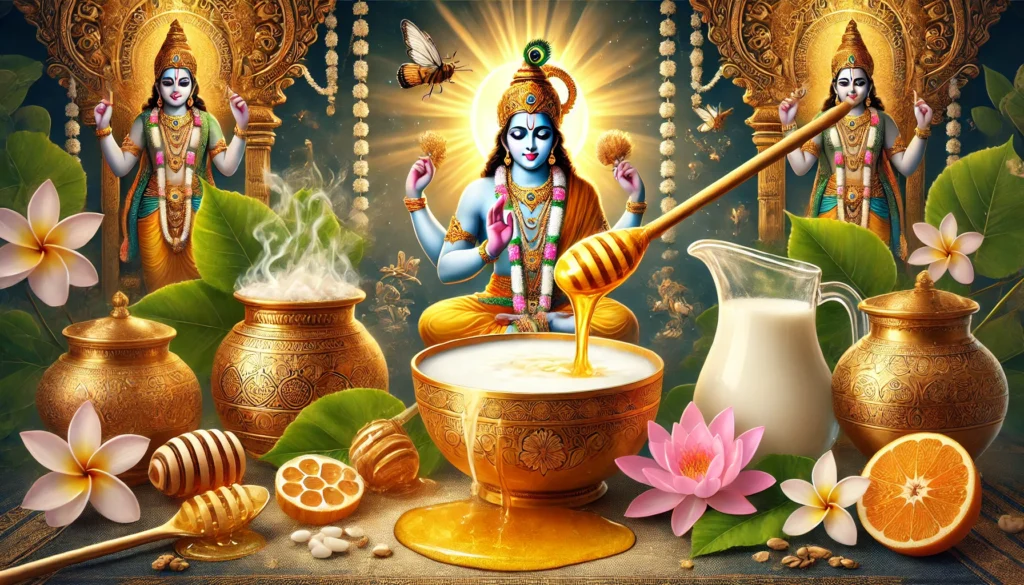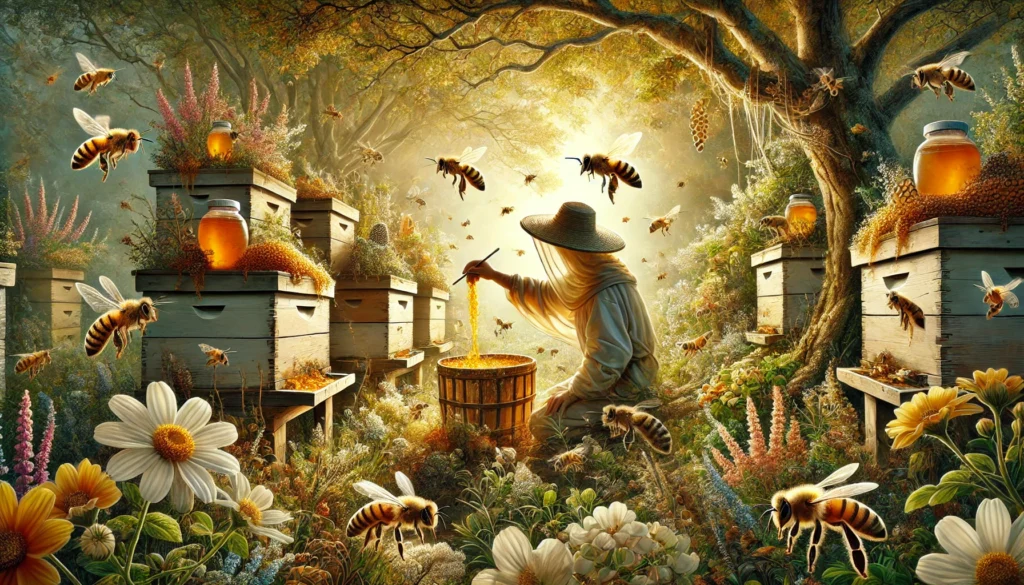- Home
- Health & Well-being
- Spiritual Path
- Is Honey Vegetarian? Role in I ...
Honey has been a symbol of vitality, prosperity, and nourishment throughout various cultures, particularly in Hinduism, where it holds deep spiritual, medicinal, and cultural significance. In Hinduism, the classification of food as vegetarian or non-vegetarian often carries ethical and spiritual weight. Understanding whether honey is considered vegetarian in Hindu tradition requires a thorough examination of its role in scriptures, its health benefits in Ayurveda, and its sustainability in ethical practices.

Scriptural References
In Hinduism, the importance of food and its impact on the body, mind, and soul is central to spiritual practices. Honey, as a substance used in rituals and daily life, is frequently mentioned in sacred texts, emphasizing its purity and significance.
- Atharva Veda
The Atharva Veda, one of the four Vedas, highlights honey’s spiritual significance. It is considered a symbol of vitality, prosperity, and a means of enhancing one’s well-being. The Vedic hymns describe honey as a source of nourishment, not just for the body, but also as a spiritual symbol of harmony between humans and nature.
Source: Sacred Texts - Bhagavad Gita
In the Bhagavad Gita, honey is included in the list of sattvic (pure) foods. Chapter 17 of the Gita describes how sattvic foods are nourishing, healthy, and contribute to a calm and peaceful state of mind. These foods are said to be rich in life and prana, promoting both physical and spiritual health. As honey is considered pure, it falls under this category and is viewed favorably for those on the spiritual path.
Source: Bhagavad Gita, Chapter 17, Verses on Food - Upanishads
The Upanishads, which delve into the nature of the universe and the interconnectedness of life, support ethical consumption and highlight the significance of harmony between humans and nature. In this context, honey is considered to embody this interconnectedness, as it is produced by bees, which play a crucial role in sustaining the ecological balance. This perspective further aligns honey with sattvic and ethical practices in Hinduism.
Source: Upanishads Commentary

Ayurveda and Health
In Ayurveda, honey is regarded as a potent medicinal substance. Its health benefits, including its antimicrobial, antioxidant, and anti-inflammatory properties, make it a staple in Ayurvedic treatments. Honey is used not only for its nutritional value but also for its therapeutic effects on various ailments.
- Ayurvedic Texts
Ayurveda emphasizes the health benefits of honey, particularly its ability to balance the doshas (body energies) and treat ailments such as digestive issues, cough, and respiratory problems. Honey is considered a rejuvenating food that helps in detoxification and is also known to improve skin health, digestion, and overall vitality. Its medicinal use reinforces its positive, pure attributes in the context of Hinduism.
Source: Ayurvedic Healing - National Center for Biotechnology Information (NCBI)
Modern scientific studies have confirmed many of the traditional health claims about honey. Research has shown that honey possesses antioxidant, antibacterial, and anti-inflammatory properties. These properties make it a valuable substance in both traditional and modern medicine. While Ayurveda has long recognized honey’s therapeutic benefits, contemporary science has provided evidence of its effectiveness in treating wounds, improving immunity, and promoting gut health.
Source: NCBI
- Ayurvedic Texts

Sustainability and Ethical Practices
The ethical and sustainable production of honey is an important consideration in the Hindu tradition, which places great emphasis on respecting nature and all living creatures. Over time, honey collection methods have evolved, and with advancements in beekeeping practices, there are now ethical and non-harmful ways to harvest honey that protect bee populations and ensure their survival.
- FAO (Food and Agriculture Organization of the United Nations)
The FAO provides guidelines for sustainable beekeeping, which emphasize the importance of ethical honey harvesting practices. These modern practices focus on protecting bee populations by ensuring they are not harmed during honey collection. Beekeepers use advanced, non-invasive methods that allow bees to continue thriving, ensuring the balance of the ecosystem is maintained. These sustainable practices align with Hindu principles of ahimsa (non-violence), as they aim to minimize harm to bees while still enabling honey to be harvested.
Source: FAO Beekeeping Guidelines - The Hindu
Traditional honey collection practices in India have always placed a strong emphasis on minimal harm to the bees. With the advancement of modern beekeeping techniques, ethical honey harvesting has become more refined. Today, many beekeepers employ methods that ensure bees are not disturbed or harmed in the process. These practices are completely ethical, as they promote the well-being of the bee colonies, enabling them to continue their vital role in pollination and environmental health. In this context, honey collection aligns with Hindu values of respect for all living creatures and environmental stewardship.
Source: The Hindu

Cultural and Religious Context
Honey plays a prominent role in Hindu rituals and is deeply embedded in the cultural practices of India. It is not only a physical substance but also carries profound spiritual symbolism.
- Britannica
The Encyclopedia Britannica explains that honey has significant cultural value in Indian rituals. It is used in various offerings and ceremonies, particularly during auspicious events such as weddings and festivals. Honey is often offered to deities during prayers, symbolizing purity, sweetness, and the spiritual nourishment of the soul.
Source: Britannica - Sanskriti Magazine
In Sanskriti Magazine, honey’s role in Hindu rituals is explored further. It is viewed not only as a symbol of material prosperity but also as an offering to the divine. In certain practices, honey is mixed with other substances to create prasad (sacred offerings), which are then consumed by devotees to purify the mind and soul. Honey’s role in these practices illustrates its importance in connecting the devotee to higher spiritual consciousness.
Source: Sanskriti Magazine - Learn Religions
In the context of Sanatan Dharma, honey is also used in the preparation of sacred offerings such as Panchamrit, a mixture of milk, yogurt, honey, ghee, and sugar, which is used to bathe idols during religious ceremonies. This practice highlights honey’s symbolic importance as a substance that purifies, nourishes, and facilitates spiritual growth.
Source: Learn Religions

Conclusion: Is Honey Vegetarian?
The question of whether honey is vegetarian is complex, especially within Hinduism. While some people avoid honey due to ethical concerns regarding the treatment of bees, it is generally considered vegetarian in Hindu tradition. This is because it is not derived from the slaughter of animals and is seen as a pure, sattvic food that aligns with Ayurvedic and spiritual practices.
In Hindu scriptures, Ayurveda, and cultural practices, honey is revered for its purity, medicinal benefits, and spiritual significance. Its use in rituals, medicinal treatments, and as a symbol of prosperity and vitality reinforces its place as a sacred substance in Sanatan Dharma. Furthermore, the ethical considerations around the harvesting of honey have been addressed with the advancement of modern beekeeping techniques. These practices are now designed to be non-invasive and non-harmful to the bees, ensuring their well-being and the continued ecological balance. This alignment with Hindu values of ahimsa (non-violence) and respect for nature supports the view that honey, when harvested ethically, is a sustainable and morally acceptable substance for consumption.
By protecting the bees and their habitat through sustainable practices, honey remains a symbol of harmony between humans and nature, making it a fitting and ethically sound choice within the context of Hindu vegetarianism.

References
- Sacred Texts – Atharva Veda. Retrieved from: https://www.sacred-texts.com
- Bhagavad Gita – Chapter 17, Verses on Food. Retrieved from: https://www.bhagavad-gita.org
- Upanishads Commentary – Upanishads Insights. Retrieved from: https://www.upanishads.org
- Ayurvedic Healing – Ayurvedic Texts on the Health Benefits of Honey. Retrieved from: https://www.ayurvedic-healing.com
- National Center for Biotechnology Information (NCBI) – Scientific Studies on Honey’s Antioxidant, Antibacterial, and Anti-inflammatory Properties. Retrieved from: https://www.ncbi.nlm.nih.gov
- FAO Beekeeping Guidelines – Sustainable Beekeeping and Ethical Practices. Food and Agriculture Organization of the United Nations. Retrieved from: https://www.fao.org
- The Hindu – Articles on Traditional and Modern Honey Collection Practices in India. Retrieved from: https://www.thehindu.com
- Encyclopedia Britannica – The Cultural Significance of Honey in Indian Rituals. Retrieved from: https://www.britannica.com
- Sanskriti Magazine – Honey’s Role in Sanatan Dharma Rituals and Its Symbolism in Indian Culture. Retrieved from: https://www.sanskritimagazine.com

Final Thought
Honey has been revered for centuries—not just as a natural sweetener, but as a symbol of nourishment, purity, and healing across various traditions. From Vedic scriptures and Ayurvedic practices to modern scientific studies, its place in health, culture, and spirituality continues to spark curiosity and dialogue.
This article presents a blend of perspectives to inspire thoughtful exploration. Interpretations may differ based on personal beliefs, cultural background, and evolving practices—and that diversity of thought is what keeps these conversations meaningful.
We invite readers to reflect, explore further, and engage with both traditional wisdom and contemporary insights, embracing the balance between heritage, ethics, and conscious living in their own way.



96 replies on “Is Honey Vegetarian? Role in Indian Hindu Tradition ”
I’ve been exploring terpene-based products blackberry kush terpenes recently, and I’m deep down enjoying the experience. The scents are in the chips, real, and pleasant. They enlarge a discriminative touch to my constantly programmed, ration beat up a compare the mood and atmosphere. A brobdingnagian find to save anyone who appreciates pungent wellness tools.
I’ve been using Are Mushroom vapes good? daily on account of during the course of a month for the time being, and I’m justifiably impressed before the uncontested effects. They’ve helped me judge calmer, more balanced, and less tense throughout the day. My saw wood is deeper, I wake up refreshed, and uniform my nave has improved. The trait is famous, and I appreciate the common ingredients. I’ll categorically keep buying and recommending them to everyone I be aware!
1tvyzx
Honestly, I’m obsessed with these CBD gummies like https://www.cornbreadhemp.com/pages/what-are-the-laws-about-thc-gummies-in-pennsylvania ! I’ve tried a lot of brands, but these are legit the best. I soft drink united after a protracted prime and it objective helps me depress abroad and stop overthinking everything.
They swallow like authentic bon-bons no grotesque grassy flavor at all. My take a nap has been feeling improved since I started fascinating them, too. If you’re on the fence, objective become them! They’re a unmitigated lifesaver after my everyday stress.
двухкомнатная квартира купить жк светский лес
костюм утепленный мужской мужские костюмы спб
Коррозия на авто? антикор автомобиля цена мы используем передовые шведские материалы Mercasol и Noxudol для качественной защиты днища и скрытых полостей кузова. На все работы предоставляется гарантия сроком 8 лет, а цены остаются доступными благодаря прямым поставкам материалов от производителя.
Spiele Spa? Fancy Fruits online spielen bietet dir die Moglichkeit spannende Casino-Spiele bequem von Zuhause aus zu genie?en. Die Auswahl reicht von klassischen Spielautomaten bis hin zu aufregenden Live-Casinotischen, wo du mit echten Dealern interagieren kannst. Erlebe Nervenkitzel und spannende Gewinnchancen in der Welt der Online-Casinos.
Русские подарки и сувениры купить в широком ассортименте. Классические и современные изделия, национальные символы, качественные материалы и оригинальные идеи для памятных и душевных подарков.
Нужно казино? ап икс официальный современные игры, простой вход, понятный интерфейс и стабильная работа платформы. Играйте с компьютера и мобильных устройств в любое время без лишних сложностей.
магазин ремней ремни.рф оригинальные модели из натуральной кожи для мужчин и женщин. Классические и современные дизайны, высокое качество материалов, аккуратная фурнитура и удобный выбор для любого стиля.
Самые качественные блины на штангу на заказ широкий выбор весов и форматов. Надёжные материалы, удобная посадка на гриф, долговечное покрытие. Подходят для фитнеса, пауэрлифтинга и регулярных тренировок.
Нужна топливная карта? https://bts-oil.ru удобный контроль расходов на ГСМ, безналичная оплата топлива, отчетность для бухгалтерии и снижение затрат автопарка. Подключение по договору, выгодные условия для бизнеса.
Хочешь контролировать ГСМ https://bts-oil.ru экономия на топливе, контроль заправок, детальная аналитика и закрывающие документы. Решение для компаний с собственным или арендованным автопарком.
Контроль топлива топливные карты для юр лиц удобный способ учета и оплаты топлива без наличных. Контроль заправок, лимиты по авто и водителям, отчетность для бухгалтерии и снижение затрат на содержание автопарка.
Топливный контроль топливная карта для юридических лиц эффективное решение для бизнеса с транспортом. Безналичная заправка, учет топлива, детальные отчеты и удобное управление расходами по каждому автомобилю.
Онлайн-казино Mostbet — слоты, настольные игры и live-дилеры в одном аккаунте. Удобные депозиты, оперативный вывод средств, бонусные предложения и игра с любого устройства.
Топливные карты для юр лиц https://mazdacenter.ru контроль топлива, прозрачная отчетность, удобство для бухгалтерии и безопасность расчетов. Экономия времени и средств при управлении корпоративным транспортом.
Top Stories: https://md.un-hack-bar.de/s/fxe9cessrw
Expand at the link: click over here now
Live match http://sporx.com.az results, the latest sports news, transfers, and today’s TV schedule. Live updates, key events, and all sports information in one portal.
A sports portal http://sbs-sport.com.az with breaking news, statistics, and expert commentary. Match schedules, transfers, interviews, and competition results are available in real time.
Учишься в МТИ? помощь мти: консультации, разъяснение сложных тем, подготовка к тестированию и экзаменам. Удобный формат, быстрые ответы и поддержка на всех этапах обучения.
Live streams https://golvar.com.az/ az and live matches online, including the latest football schedule for today. Follow games in real time, find out dates, start times, and key events of football tournaments.
Zinedine Zidane zidan.com.az biography, football career, achievements, and coaching successes. Details on his matches, titles, the French national team, and his time at the top clubs in world football.
Нужна курсовая? заказать курсовую работу Подготовка работ по заданию, методическим указаниям и теме преподавателя. Сроки, правки и сопровождение до сдачи включены.
Авиабилеты по низким ценам https://tutvot.com посуточная аренда квартир, вакансии без опыта работы и займы онлайн. Актуальные предложения, простой поиск и удобный выбор решений для путешествий, работы и финансов.
Looking for a casino? PlayOJO registration offers over 7,000 slots and games, cashback on every bet, and fast withdrawals without restrictions. Simple registration and instant access to all games available.
Нужен тепловизор? производство тепловизоров для судов, лодок, кораблей, яхт и катеров от производителя: доступные цены, подтверждённое качество и официальная гарантия. Мы оперативно доставляем заказы по всей территории России и стран СНГ. Наши представительства работают в Санкт?Петербурге, Москве и Севастополе — выбирайте удобный пункт выдачи и получайте заказ в минимальные сроки.
заклепка вытяжная 4 мм заклепка вытяжная купить
Проверил сейчас кракен зеркало загружается быстро без ошибок подключения
Нужна топлевная крата? топливные карты для юридических лиц: заправка на сетевых АЗС, единый счет, прозрачный учет топлива и онлайн-контроль расходов. Удобное решение для компаний с собственным автопарком.
Русские подарки купить в интернет-магазине Москвы: сувениры, ремесленные изделия и подарочные наборы с национальным колоритом. Идеальные решения для праздников, гостей и корпоративных подарков.
Skip to details: free bible maps
Для прибирання https://cleaninglviv.top/ зручно
ДВС и КПП https://vavtomotor.ru автозапчасти для автомобилей с гарантией и проверенным состоянием. В наличии двигатели и коробки передач для популярных марок, подбор по VIN, быстрая доставка и выгодные цены.
дизайн коттеджа квартиры дизайн коттеджа
Do you do music? tracing music notes worksheet for children and aspiring musicians. Educational materials, activities, and creative coloring pages to develop ear training, rhythm, and an interest in music.
ток ток накрутка лайков накрутка просмотров инстаграм
дизайн кв квартира дизайн двухкомнатных квартир 40 кв м
Лучшие и безопасные противопожарный резервуар с насосной станцией эффективное решение для систем пожарной безопасности. Проектирование, производство и монтаж резервуаров для хранения воды в соответствии с требованиями нормативов.
Курсы подготовки ЕГЭ 11 класс https://courses-ege.ru
Подземный топливный резервуар https://underground-reservoirs.ru
Лучшее казино регистрация вавада слоты, настольные игры и live-казино онлайн. Простая навигация, стабильная работа платформы и доступ к играм в любое время без установки дополнительных программ.
терминус полотенцесушители полотенцесушитель ванны купить
Фриспины бесплатно фриспины без депозита бесплатные вращения в онлайн-казино без пополнения счета. Актуальные предложения, условия получения и список казино с бонусами для новых игроков.
накрутка просмотров на пост накрутка комментариев в телеграм
exclusive deals page – The checkout flow worked perfectly and delivery tracking was reliable.
official online store – The clean visuals and structure inspire confidence while shopping.
discover great finds – Found some fantastic pieces and the checkout flow worked perfectly.
ranch supply destination – Everything required was easy to locate, and the pricing structure seems reasonable.
реферат через нейросеть реферат через нейросеть .
сделать реферат сделать реферат .
лучшая нейросеть для учебы nejroset-dlya-ucheby-7.ru .
нейросеть для школьников и студентов нейросеть для школьников и студентов .
latte boutique – Love the warm presentation and the curated selection of items.
внедрение 1с стоимость внедрение 1с стоимость .
внедрение 1с 8 3 внедрение 1с 8 3 .
зоо порно
Shop Cyber Shield – Safety tools seem effective and their features are easy to understand.
мелбет зеркало скачать на айфон мелбет зеркало скачать на айфон .
мелбет приложение скачать мелбет приложение скачать .
melbet приложение для ios melbet приложение для ios .
visit warehousewhim – Items are well organized, making browsing simple and enjoyable.
sipandsupply hub – Great products and the website is visually clean and organized.
Top Ruby Roost – High-quality imagery makes the collection stand out beautifully.
sunsetstitch essentials – Items look fantastic and ordering was smooth and quick.
Watch Wildwood Studio – Attractive design and moving between pages is smooth.
выбор онлайн школы best-schools-online.ru .
рекламный креатив рекламный креатив .
Xelivo Station – Intuitive structure and navigation makes finding information a breeze.
обучение в интернете best-schools-online.ru .
водопонижение на строительной площадке xn—77-eddkgagrc5cdhbap.xn--p1ai .
Bright Bento Favorites – Nice assortment with helpful product explanations.
Blue Quill World – Layout is clean and finding products is straightforward today.
проектирование водопонижения vodoponizhenie-moskva.ru .
онлайн школа для школьников best-schools-online.ru .
official Bright Bloomy hub – Friendly design and bright visuals make browsing effortless.
Bold Basketry Vault – Well-structured pages and products are presented clearly today.
Elmhurst United community portal – Discover resources and activities designed to connect residents.
sms activate login sms activate login .
перепланировка квартиры согласование sostav.ru/blogs/286398/77663 .
best virtual number service http://www.linkedin.com/pulse/top-5-sms-activate-services-ultimate-guide-virtual-phone-mike-davis-gnhre/ .
intriguing publications ReislinOfficiall and new materials appear regularly, creating a truly immersive experience. Personal moments, striking provocations, and unexpected materials are featured. Stay tuned for new publications.
согласование перепланировки москва согласование перепланировки москва .
sms activation http://www.linkedin.com/pulse/top-5-sms-activate-services-ultimate-guide-virtual-phone-mike-davis-gnhre/ .
find great products here – Support replied fast and solved my problem without delay.
headlinehub updates – Insights are easy to find and the pages respond instantly.
berryaisle.shop – Support replied fast and handled my query very professionally.
Wild Crate Online Store – Smooth performance and contemporary design make mobile browsing great.
Clear Deals Online – Browsing is simple and the items are engaging and well-presented.
Raven Crate Supply – Easy menus and a neat presentation make the shopping experience smooth.
mostbet результаты live http://mostbet52718.help
visit KnickNook – Sweet selection of goodies, I plan to come back and shop again.
Light Finds – An airy online store where discovering chic products is simple and enjoyable.
pinup apuestas pinup37056.help